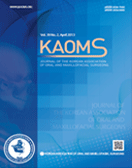Journal of the Korean Association of Oral and Maxillofacial Surgeons
- Log In/Sign Up
- P-ISSN2234-7550
- E-ISSN2234-5930
- SCOPUS, KCI, ESCI
 ISSN : 2234-7550
ISSN : 2234-7550
Prediction of intensive care unit admission using machine learning in patients with odontogenic infection
Sung Min Park (Department of Oral and Maxillofacial Surgery, Graduate School of Dentistry, Dankook University, Cheonan, Korea)
Abstract
Objectives: This study aimed to develop and validate a model to predict the need for intensive care unit (ICU) admission in patients with dental infections using an automated machine learning (ML) program called H2O-AutoML. Materials and Methods: Two models were created using only the information available at the initial examination. Model 1 was parameterized with only clinical symptoms and blood tests, excluding contrast-enhanced multi-detector computed tomography (MDCT) images available at the initial visit, whereas model 2 was created with the addition of the MDCT information to the model 1 parameters. Although model 2 was expected to be superior to model 1, we wanted to independently determine this conclusion. A total of 210 patients who visited the Department of Oral and Maxillofacial Surgery at the Dankook University Dental Hospital from March 2013 to August 2023 was included in this study. The patients’ demographic characteristics (sex, age, and place of residence), systemic factors (hypertension, diabetes mellitus [DM], kidney disease, liver disease, heart disease, anticoagulation therapy, and osteoporosis), local factors (smoking status, site of infection, postoperative wound infection, dysphagia, odynophagia, and trismus), and factors known from initial blood tests were obtained from their medical charts and retrospectively reviewed. Results: The generalized linear model algorithm provided the best diagnostic accuracy, with an area under the receiver operating characteristic values of 0.8289 in model 1 and 0.8415 in model 2. In both models, the C-reactive protein level was the most important variable, followed by DM. Conclusion: This study provides unprecedented data on the use of ML for successful prediction of ICU admission based on initial examination results. These findings will considerably contribute to the development of the field of dentistry, especially oral and maxillofacial surgery.
- keywords
- Intensive care units, Infections, C-reactive protein, Machine learning, Algorithms
- Downloaded
- Viewed
- 0KCI Citations
- 0WOS Citations